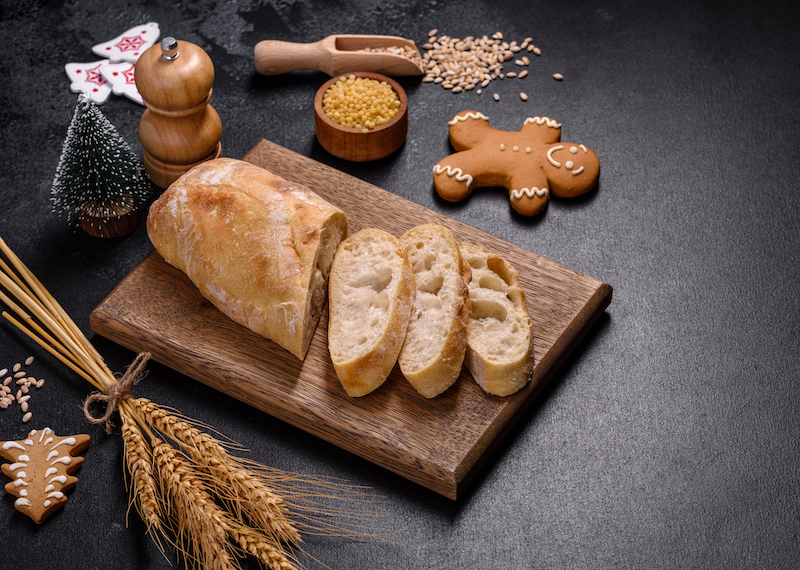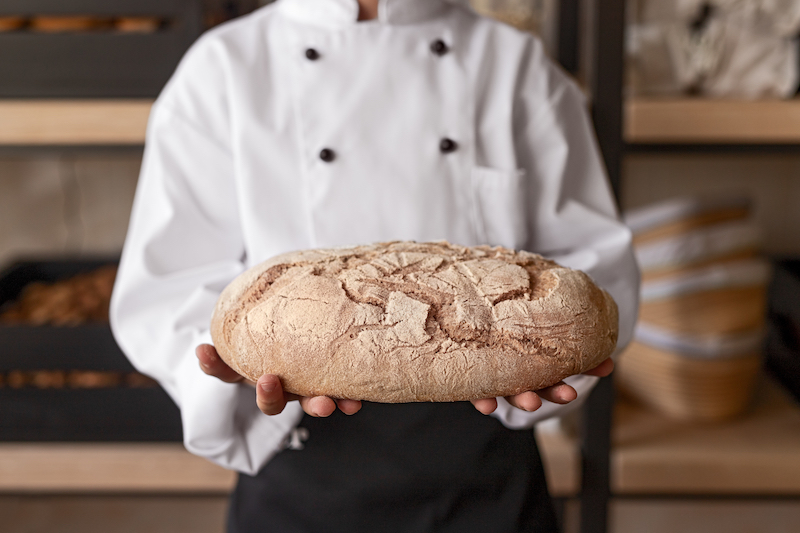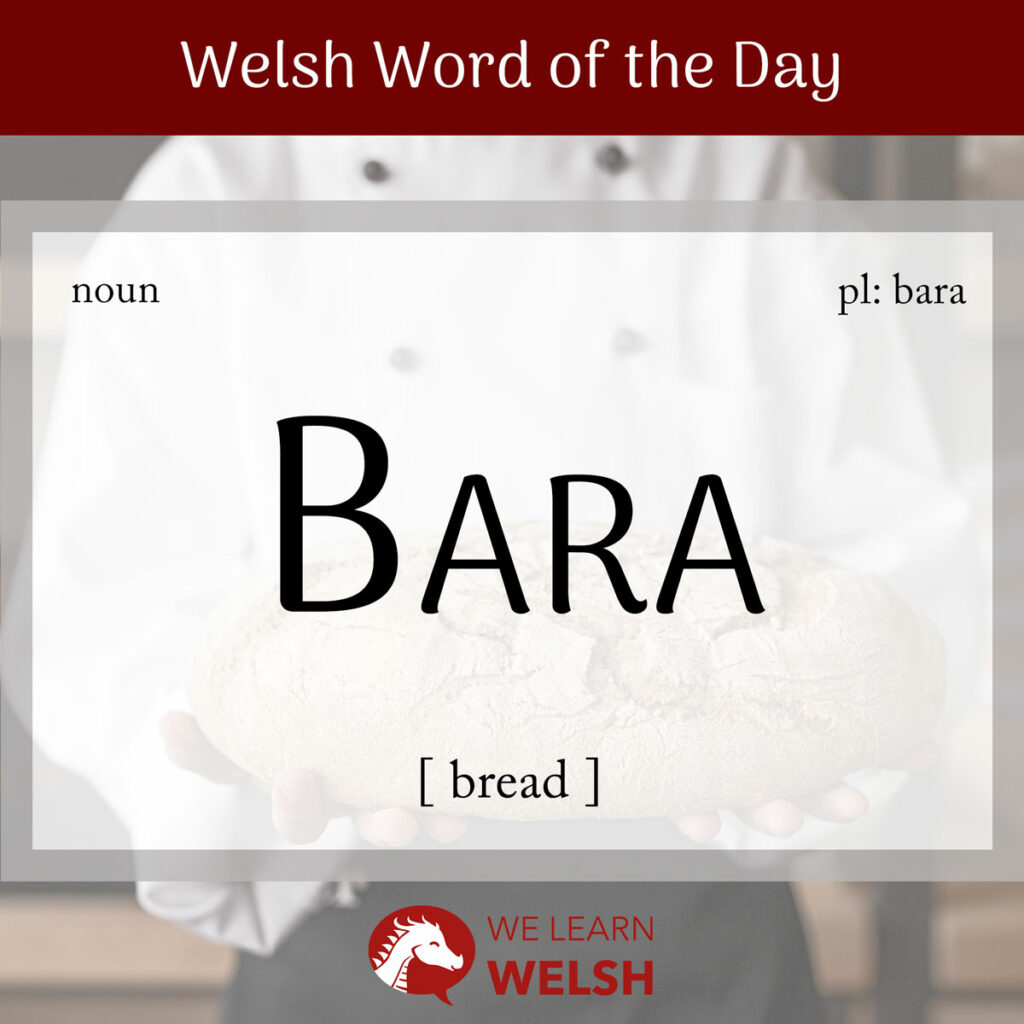Bread in Welsh is bara (plural: bara), and it’s as much of a staple in Wales as anywhere else. Plenty of classic Welsh dishes rely on bara – from bara brith, a dried fruit loaf flavoured with tea and spices, to caws pobi, the melted cheese-on-toast dish known across the border as Welsh rarebit, to cawl, a rich stew of meat and vegetables usually served with a thick hunk of bara.
bara
bread
Bara comes from the proto-Celtic *bargina, meaning cake or bread. The Irish word for loaf, bairín (as in the sweetbread bairín breac, which is similar to bara brith) may be a cognate.
It’s been used in the Welsh language since the thirteenth century, and can be heard across the country. However, in the South it’s usually pronounced slightly differently, with a long a sound as in father:

At any caffi (café) in Wales you’ll see plenty of patrons enjoying a couple of slices of tost ymenyn (buttered toast) with their paned o de (cup of tea), or a brechdan (sandwich), often with creision (crisps) served on the side.
At the siop fara (bakery), you might order a whole torth (loaf) of bara brwd (freshly baked bread), or a torth dafellog (sliced loaf) at the archfarchnad (supermarket).
You might then need to specify whether you want a torth wen (white loaf) or torth goch (brown loaf, literally red loaf). Notice that after torth, gwyn (white) takes its feminine form gwen, and both gwen and coch mutate. This is because torth is a feminine noun, so it causes a feminine mutation on the first letter of adjectives that follow it.
The plural of torth is torthau, although it’s also common to just say bara to refer to multiple loaves.
Bara is a masculine noun, and there aren’t many contexts in which you’d need to use a mutated form of it: perhaps if you were talking about fy mara (my bread) or dy fara (your bread). Regardless, here’s how bara mutates:
Soft mutation
fara
Nasal mutation
mara
Aspirate mutation
N/A
If you don’t usually buy bread (prynu bara) at the archfarchnad or siop fara, you might bake bread (pobi bara) at home, and if it’s good enough, you could even sell bread (gwerthu bara), though not if you end up making bara clatsh (badly risen bread). Worse yet, bara mall, a term which Geiriadur Prifysgol Cymru records being used in Bangor – mall literally means plague or destruction, which is probably not what you want your bread to taste like!
Here’s a few more examples of verbs commonly used with bara:
- bwyta bara (to eat bread)
- hoffi bara (to like bread)
- mwynhau bara (to enjoy bread)
- dwlu ar fara (to love bread)
- crasu bara / tostio bara (to toast bread)
- tafellu bara (to slice bread)
- rhoi menyn ar fara (to butter bread)
- byw ar fara a chaws (to live on bread and cheese)
- torri bara (to break bread)

Like in English, torri bara can be used in an idiomatic sense, referring to spending time with someone or being friendly with them: torri bara efo fo/hi (breaking bread with him/her).
Wyt ti eisiau bara gwyn neu goch?
Do you want white or brown bread?
Not a huge amount is known about traditional Welsh cuisine (coginiaeth Cymru) compared to that of other European countries. This is likely because it derives mostly from food eaten by ordinary working people, who wouldn’t have had the time or resources to record their recipes (ryseitiau). However, coginiaeth Cymru often relies on simple ingredients including caws (cheese), cennin (leeks), bresych (cabbage), cig oen (lamb), pysgod (fish), and, of course, bara.
Baked treats are also well-loved in Wales, and are usually enjoyed with a paned (cuppa). The most famous of these is probably bara brith, which is also known as teisen dorth (literally: loaf-cake) in the South-East. It’s even travelled all the way to Argentina with Welsh settlers, where it’s now known in Spanish as torta negra (black cake).
Another iconic export is Welsh cakes, which are known as picau ar y maen (little cakes on the stone) or teisennau gradell (griddle cakes) in Wales, as traditionally, they’re cooked on a cast-iron griddle. They’re small spiced cakes a bit like scones (sgons), though usually eaten without jam and cream.
Pwdin bara (bread and butter pudding) is also a popular dessert, as are bara croglith (hot cross buns), and leicecs, which are a bit like a cross between a Welsh cake and a pancake (crempogen).
Maen nhw’n pobi’r bara’n ffres bob dydd.
They bake the bread fresh every day.
The cultural importance of bread extends to figures of speech. Historically, to be ar fara drwg (literally: on bad bread) meant to be in a bad state.
Bara can also refer more generally to any kind of food, or to sustenance and even one’s livelihood, similar to the way in which dough to mean money in English. So, someone who is in a good state of health is bwyta bara iach (eating healthy bread).
The bread of the Eucharist can be referred to as bara cyfraith (literally: the bread of the law). Another religious term is bara nefol (manna).
The Welsh language distinguishes between bara pryn (shop-bought bread) and bara cartref (home-baked bread). Though fresh home-baked bread is definitely nicer, I think if I made it myself I’d be more likely to end up with bara mall!

